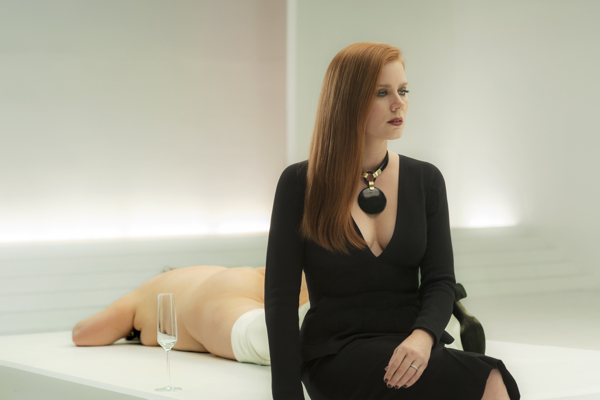Movie review by Greg Carlson
Partially avoiding the sophomore slump, renaissance man Tom Ford’s “Nocturnal Animals” is less rewarding and accomplished than “A Single Man.” Adapted by the director from Austin Wright’s 1993 novel “Tony and Susan,” “Nocturnal Animals” is a stylishly designed noir that alternates between the terror of a West Texas road nightmare and the misfortunes of an icy Los Angeles gallerist in a precarious, toxic marriage. Ford can be commended for allowing the menagerie of miserable wretches on display to be so thoroughly and defiantly mean, but his film will leave many gasping for air.
Susan (Amy Adams) receives an advanced copy of a novel by her first husband Edward (Jake Gyllenhaal), who has titled it “Nocturnal Animals” in Susan’s honor. The papercut received by Susan as she opens the package is but the first portent that the contents of Edward’s fiction will haunt his ex, who is riveted by the unsettling page-turner. As Susan reads, the film shifts into the fictionalized world created by Edward, in which a family of three is waylaid by a trio of grinning monsters led by Aaron Taylor-Johnson’s swaggering Ray Marcus. Each time the horror escalates, Ford leaves the events of the manuscript to dramatize Susan’s shaken reactions, calling upon Adams to do some heavy lifting in the absence of a rich and complex character.
Additionally, Ford introduces a third thread, in which Susan reminisces about her life with Edward some two decades in the past. These glimpses into the circumstances that led to the downfall of her marriage include a confrontation between Susan and her mother Anne, a Texas blue blood who strongly objects to her daughter’s intention to marry a person deemed unworthy. In a curious bit of casting, Anne is portrayed by the great Laura Linney, who is far too young to be the parent of someone played by Adams. The two actors are only separated by ten years, and the age makeup doesn’t convince.
Occasionally, Ford shows glimmers of twisted humor, but the film takes itself too seriously to allow the juiciest amusements to pay long-term dividends. The L.A. art scene vampires, nicely represented by the chunky black frames and pointy shoulder pads of Jena Malone’s caustic Sage Ross, are comically juxtaposed with the ghoulish, manic, Texas troublemakers (in one scene, Taylor-Johnson wipes his ass while seated on an outdoor porch commode custom-plumbed by his smug redneck). Ford’s tone is often inscrutable, and nobody – including Susan, who may be about to get her just desserts – deserves much sympathy.
The pulpy “Nocturnal Animals” is much closer to a forgettable genre exercise like Ridley Scott’s “The Counsellor” than to the supercharged fever dreams of David Lynch’s “Wild at Heart.” Not even the arresting opening images of obese nudes, photographed in silky slow motion, can clear a path for any statement Ford hopes to make regarding the business of art and the trap of artifice. Revenge has fueled many great movies, from “The Big Heat” to “Three Colours: White” to “I Saw the Devil,” but the ambiguities of “Nocturnal Animals” will leave you desiring a kind of satisfaction that proves too elusive and slippery for Ford and his collaborators to deliver.
